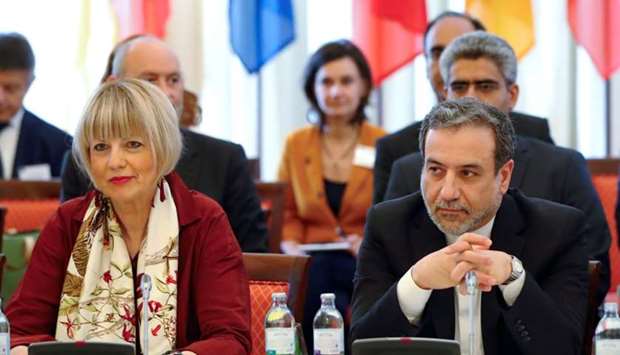European proposals to boost business with Iran are a
step forward but will likely be insufficient to stop Tehran from
exiting its nuclear deal with major powers, Iranian Deputy Foreign
Minister Abbas Araqhchi said Friday.
Senior diplomats from five major powers including Britain, France and
Germany met Araqhchi in Vienna, after Tehran threatened to gradually
stop implementing the 2015 deal.
Iran's threat is a reaction to the US decision to walk away from the
pact and to revive sanctions that target the Islamic Republic's oil
exports and its international financial transactions.
On Friday, European powers announced the start of their so-called
Instex scheme, a barter system for European-Iranian trade that is
meant to avoid US sanctions.
"INSTEX now operational, first transactions being processed and more
EU Members States to join," tweeted senior EU diplomat Helga Schmid,
who led the Vienna meeting.
"I believe that it was a positive and constructive meeting," Araqhchi
told reporters after his talks with senior diplomats from Britain,
France, Germany, Russia China and the European Union.
He said that the activation of Instex was "one step forward," but
added that "it is still not enough." "It is still not meeting Iran's
expectations," he said.
What Iran really wants is for European countries to buy Iranian oil,
he stressed, voicing a demand that is unlikely to be met.
Companies with business in the US fear that any contracts with Iran
would make them a target of Washington's punitive measures.
If European efforts to mitigate US sanctions continue to fall short
of Tehran's expectations, Iran will go ahead with its plan to stop
implementing key provisions of its 2015 nuclear deal with world
powers, he said.
He stressed, however, that it was now up to Iranian leaders to decide
on the way forward.
Foreign Ministers from Iran and the five powers are planning to meet
in the coming weeks, Araqhchi announced.
Iran said in May that it would gradually exit the 2015 deal, by
breaking certain limits on uranium enrichment this week and, in early
July, that were designed to prevent the development of a nuclear
warhead.
An Iranian official said hours before the Vienna meeting that the
first of the two limits, which regulates how much uranium can be
stocked, had not yet been surpassed.
The official warned that Iran would reconsider its currently peaceful
nuclear policy and would take steps to leave the global Nuclear
Non-Proliferation Treaty in case the UN Security Council punishes
Iran for exiting the 2015 pact.
Senior Chinese arms control official Fu Cong told reporters Friday
afternoon that the "this has been a reasonably good meeting."
"It is conducive to easing the tensions in the region," he said,
referring to the sabre-rattling between Washington and Tehran.
President Donald Trump came close to ordering an airstrike in
retaliation against Iran's downing of a US drone near the Strait of
Hormuz, a strategically important oil-shipping route.
However, Trump has been sending mixed messages, indicating he is also
willing to hold talks with Tehran.
He said Friday in Japan that he was in no hurry to deal with Iran,
while expressing hope for a positive outcome.
"There is absolutely no time pressure. I think that in the end
hopefully it's going to work out," Trump said on the sidelines of the
G20 summit of major economies in Osaka.
"If it does, great, if it doesn't, you'll be hearing about it," he
added.
The Iranian official said in Vienna that Washington should enter into
a "ceasefire" in its economic war against Tehran if it wanted to
enter into diplomatic talks.
"If you are under bombardment, you don't go for negotiations. Because
if you go, it's not a negotiation, it's a surrender," the official
said.

Iran's top nuclear negotiator Abbas Araqchi and Secretary General of the European External Action Service (EEAS) Helga Schmit attend a meeting of the JCPOA Joint Commission in Vienna, Austria
